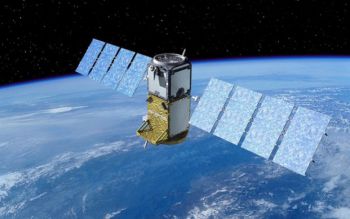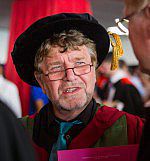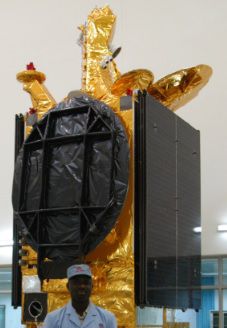Academics propose UK alternative to Galileo at just 3% of the cost of EU satellite project
By:
Last updated: Wednesday, 20 February 2019

In November Prime Minister Theresa May pulled out of the Galileo project as the EU began excluding the UK from security aspects of the project’s development

Prof Chris Chatwin

Dr Lasisi Lawal Salami with the Nigcomsat 1R satellite.
Engineering academics have drawn-up plans for a Galileo replacement that would give the UK a more effective satellite navigation system at a fraction of the price of the £9bn EU project.
University of Sussex Professor Chris Chatwin and Dr Lasisi Lawal Salami, from Nigeria's Obasanjo Space Center, have drawn up proposals for a low-cost Satellite-Based Augmentation System (SBAS) as a navigation overlay service (NOS) on a hosted national satellite. The proposals provide the UK with a cut-price alternative to Galileo which is due to launch in 2026.
In November 2018 Prime Minister Theresa May pulled out of the Galileo project, a project designed as a rival to the USA’s GPS to which the UK has contributed £1.2 billion, as the EU began excluding the UK from security aspects of the project’s development in preparation for Brexit. While the UK could still receive a basic signal from Galileo when it’s operational, the country would be excluded from the more precise military signal.
The academics suggest in a new paper, published in the Journal of Electrical and Electronics Engineering, that their system would cost around £300 million and would meet UK’s navigational needs in defence, aviation, maritime and location-based services for emergencies and crisis management.
The paper argues that the low-cost alternative could equal Galileo in terms of integrity, reliability, continuity and availability for UK’s security-relevant operations and would be five times more accurate, to within 5cm, than the EU project’s open service.
Prof Chatwin, Professor in Engineering at the University of Sussex, said: “Our system can use the GPS or Galileo free signal or both and augments it to give it a more accurate signal that is comparable to the encrypted military signal. The augmentation system has extremely accurate clocks so it provides an additional signal to the GPS signal and reduces the ambiguity of the location determination.
“If we use augmentation we can greatly reduce costs from £7 billion to £300 million, but we still depend on the US or the EU for their free signal. In the end this is a decision about sovereignty. If we still believe that we are an independent military power, then we’d have to find considerable resources to build our own GNSS system. We could call it Newton.”
The paper proposes the UK launch three geostationary satellites to provide global coverage except in extreme polar regions. It would also require an on-board augmentation system as a hoisted payload on a national satellite and complementary ground infrastructure for the United Kingdom. The academics believe the new system could be completed in just one year.
The total price of the project would only be around three times the amount already earmarked by the UK government (£92 million) for feasibility studies of an alternative system. While the construction of a new Global Navigation Satellite System (GNSS) would cost approximately £7 billion, the annual UK space budget is currently just £370 million.
The academics also believe that exclusion from Galileo should be viewed as an opportunity to open up new collaborations with non-EU partners with Nigeria offering to enter into cooperative agreement by offering access to its existing Navigation Overlay system with a service coverage area meeting the requirements of the United Kingdom.
Dr Lasisi, Vice Convenor of the UN’s International Telecommunication Union and a former PhD student at the University of Sussex, said: “A partnership with Nigeria would have the additional benefit of signalling to the rest of the world that the UK has become a more outward looking economy after Brexit and opens up the opportunity for further scientific collaboration with the rest of the world beyond the EU.”